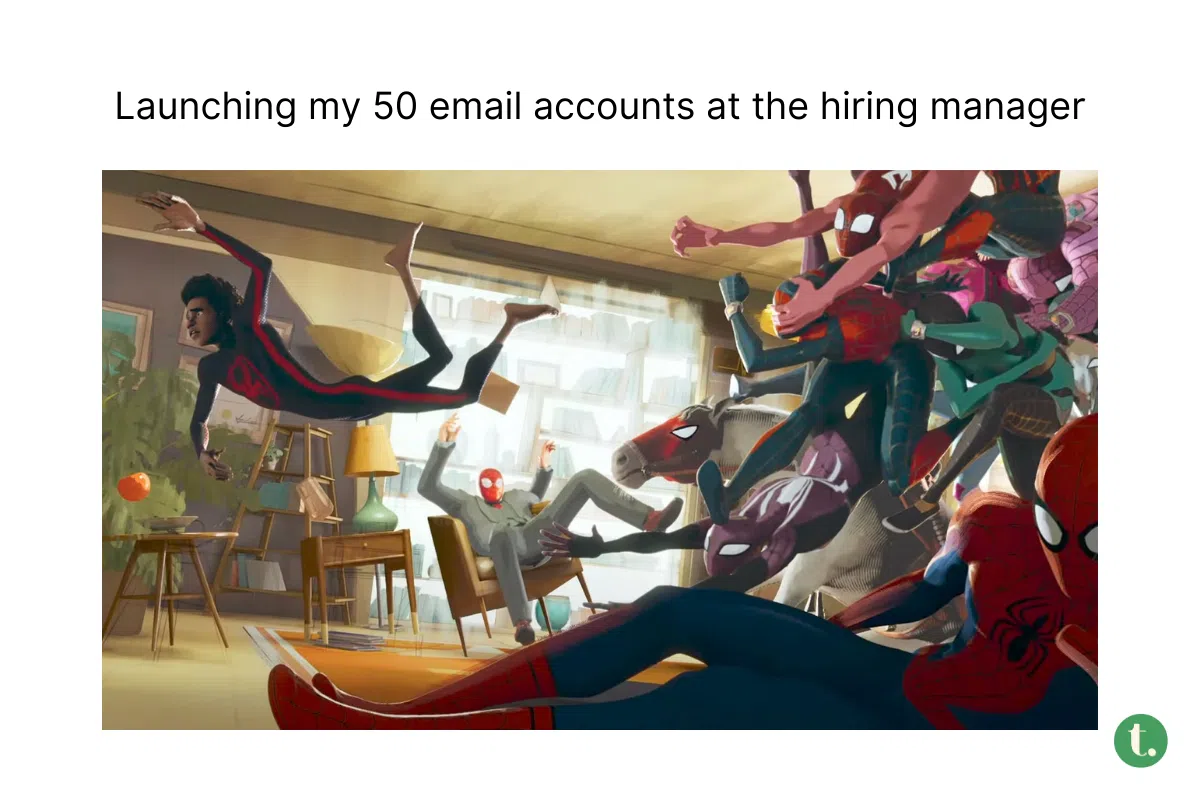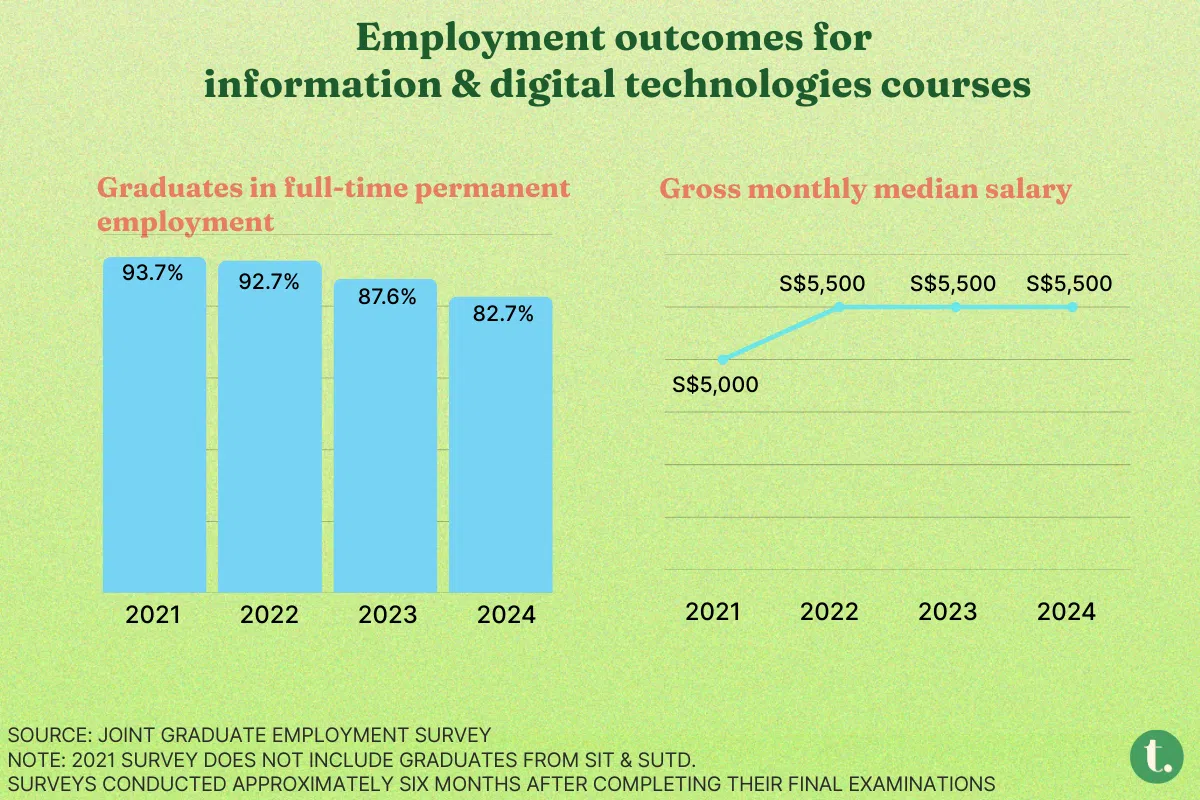Does a tech degree still pay?

Straight to your inbox. Money, career and life hacks to help young adults stay ahead.
- Find out more and sign up for thrive at bt.sg/thrive
📜 The degree that pays
[SINGAPORE] It was clear from the start of junior college that a computer science degree would not be on the cards for me. I had already set my sights on an arts degree early on.
So my parents shifted their hopes to my brother instead. I still fondly recall family dinners after his A levels, where he endured our parents’ determined nudges towards computer science.
I don’t blame them. Even before entering university, I was all too familiar with stories about computing majors making bank post graduation.
Official data from the latest Joint Autonomous Universities Graduate Employment Survey back it up. Graduates from information and digital technologies courses – including computer science – earned a gross monthly median salary of S$5,600 in 2024, second only to Law.
No surprises there, especially since a tech degree is seen as the road to lucrative careers in the big leagues like Apple, Amazon, and Google.
Its reputation only strengthened during the pandemic, when the tech hiring spree drew even more undergraduates into computing faculties.
Navigate Asia in
a new global order
Get the insights delivered to your inbox.
However, disruption from artificial intelligence (AI) in an increasingly oversaturated market has left computer science graduates racing against their friends to land jobs.
As AI evolves and the market grows more crowded, are tech degrees still the sure bet they once seemed?
📟 Where did the jobs go?
Honestly, I was a little sceptical when final-year computer science undergraduate Ben, 24 (not his real name) told me about his job-hunting struggles. After all, he had been interning at TikTok.
He told me he had sent out over 100 applications, raising the interview response process as one of the more demoralising parts of the hunt.
“Some companies can take up to three weeks just to send a rejection. When you add that waiting time to all the hours spent prepping for interviews, it starts to feel really frustrating.”
Despite his impressive line-up of prior work experiences, Ben feels the job hunt has been tougher, partly because it feels like so many computer science graduates are entering the market this year, while vacancies seem to be diminishing.
“I’ve heard of crazy strategies like applying to the same job multiple times under different e-mails,” he said. “The surge of job applications means companies get the luxury of being pickier. Interview processes are more stringent too, so the oversupply just makes things worse.”

While computer science graduates still earn some of the highest salaries, signs point to a softening market for them. The proportion of information and digital technologies graduates securing full-time permanent roles has been steadily declining since 2022, in line with graduates from other courses, data from the Joint Autonomous Universities Graduate Employment Survey show. Salaries have also largely plateaued over the same period.

⚙️ Skill issue?
We’ve all seen headlines about AI taking over entry-level roles, making it harder for fresh graduates to break into the market.
AI can, for instance, generate usable code from simple prompts without much coding experience from the user – a practice known as vibe coding.
Shannon Pang, a spokesman for global job search platform Indeed, told me that rather than AI replacing jobs in software development, new joiners are increasingly expected to have AI-related skills.
“In August alone, 57 per cent of data and analytics postings, 39 per cent of software development roles, and 35 per cent of scientific research postings referenced AI,” he said. “This indicates that employers increasingly expect engineering talent to integrate AI into existing workflows, automate repetitive tasks, or work with AI-native systems.”
Associate professor Sharon Tan, a vice-dean at the National University of Singapore (NUS) School of Computing, echoes Pang’s sentiments on AI integration and emphasises the importance of computing fundamentals.
“As AI takes on routine tasks, computing graduates are now being trained to focus on higher-level tasks involving human judgement, creative problem-solving and strategic decision-making,” she said. She also added that these skills are transferable across diverse industries beyond the tech sector, like finance, health care, public sectors, and more.
🛒 Interest in computer science degrees
Despite uncertainties in the tech sector, students are still filling in applications for tech degrees.
“I feel a tech degree is still worth it, because there’s value in learning the fundamentals to be prepared when systems behave unexpectedly,” said Yadanar, 20, a first-year Data Science & AI (DSAI) undergraduate at Nanyang Technological University (NTU) who asked to be identified only by her first name.
“The recent Cloudflare outage that barred users from ChatGPT is an example of how human coders are still essential when systems fail,” she said.
To be sure, while employment rates among computer science grads have fallen, they’re still on the higher end relative to the other courses.
And the tech industry isn’t a single monolith and certain areas, such as cybersecurity, still have solid hiring demand.
🛒 What can fresh graduates do?
Before you go scouring LinkedIn for your next internship stack, here’s some advice from Pang on what to do to stand out:
- Contribute to projects to demonstrate initiative and curiosity
- Network and learn from peers
- Being genuinely curious about the problems you’re solving
- Effort and passion are just as important as technical expertise
“For fresh tech graduates trying to stand out, my advice is simple: It can be overwhelming, but focus on building something real, not just listing skills on a resume,” he said.
“Most importantly, remember that slow progress is still progress. The job market shifts, but your potential doesn’t.”
TL;DR
- Fresh computer science graduates are finding it harder to land jobs
- There’s a growing need for graduates to be able to work collaboratively with AI
- But there’s still a high interest in tech degrees, alongside changing expectations of tech roles
- Still, there are ways to stand out in a competitive market by being genuinely curious and taking initiative
Decoding Asia newsletter: your guide to navigating Asia in a new global order. Sign up here to get Decoding Asia newsletter. Delivered to your inbox. Free.
Copyright SPH Media. All rights reserved.


